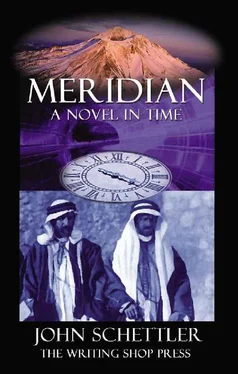It was another ten minutes of hard climbing, but they eventually reached the top of the ridge. Paul squinted towards the blood-red dawn to the east, looking for some sign of the railway, but it was still too dark. Nordhausen huffed up and sat down on a flat shale, winded and perplexed.
“Should be light soon,” he said. “Look how red the horizon is. There must be heavy clouds out that way, or smoke. The light seems too diffused.”
“Can’t make out much from here,” said Paul. “God, I hope the spatial coordinates were accurate. What was that business Kelly said about shading a variable or taking off a second or two on the numbers?”
“What? Oh the variable shade would have been a temporal adjustment I asked for. Kelly wanted to be sure we arrived before the 10th. The spatial data was approximate, of course. It was the best I could do on short notice. We certainly seem to be in the desert, but who can say where?”
“That’s what worries me.” Paul flapped his arms to try and warm himself, his long robes flowing in the dim light. “We could be miles and miles away from the rail line. Lawrence and his men had camels to get around, but we’re on foot. If the spatial coordinates are off, we could be in trouble.”
Nordhausen was quiet for some time. When he spoke, his voice had a tentative quality to it, as though he was feeling his way through something in his mind, not quite certain. “It’s the temporal coordinate that worries me more. The land forms here seem too fresh and sharp.”
“What do you mean?”
“This ridge we just came up,” he explained. “There was too much smooth rock face. It should be heavily eroded—in terraces—at least that’s the typical structure of the land in this region. These hills seem odd: too unweathered; too young.”
“Well I wouldn’t worry too much about that. There’s plenty of variation in nature. Maybe we’ve climbed a big hunk of basalt.”
“That’s an igneous rock, and there shouldn’t be much of it around.”
“Well, there were basalt deposits in Egypt that served as good quarries for the pyramids, and some in the Sinai as well.”
“Not here, Paul. Most of that geology in Jordan is farther north, above the Red Sea. The landforms here should be sedimentary rock: calcite, and dolomite limestone, and perhaps some flints or marl clay beds thrown in as well. If we’re in the lower Trans-Jordan region, where we’re supposed to be, there should be very little basalt exposed to the surface like this. That rock would have to be very old.”
“Look there!” Paul pointed east toward the red horizon where the smoky clouds parted and the sunlight streaked through in hues of deep auburn and amber. The sudden illumination shocked them with the vision of a broiling sky, thick with dark, knotted clouds that seemed to smolder and glow, replete with red embers wafting up on heavy smoke. Nordhausen looked around, a troubled expression on his face.
“What a storm,” Paul exclaimed. “Beautiful, isn’t it? And terrible.” Paul’s eyes widened at the at the sight, but his excitement left him when he saw the look on Nordhausen’s face. “What’s wrong?”
The professor stood up, sniffing the cold air, clearly disturbed. “That’s not a thunderhead, Paul. Smell that?… A kind of musty, sulfuric odor, yes?”
“Almost volcanic.” Paul was noticing things now, his senses attuned to the land and sky about him as the growing light revealed more features on the gloomy landscape. He had a sinking feeling that something was amiss.
“The only volcano of note in the area would be down near Ma’an. It shouldn’t be active, however.”
“What about all the volcanic wastelands out east?”
“Dormant for thousands of years,” said Nordhausen.
“You studied that map of yours well.”
“That and a few other notes on the geology before we left.” Nordhausen was hefting the stone in his hand. “Have a look at this,” he said as he extended the polished rock to Paul. “I saw a lot of them on the ground back there.” His arm gestured down the pathway where they had struggled in the rain earlier. “It’s quartz,” he said with an air of finality. “Shocked quartz, to be precise. Notice the striations under the surface? This is very rare, but look how the lowland glitters in places out that way.” He pointed at the gravely plain. “More of these quartz deposits, whatever they are. I found several pieces of it, and lots of little glassy beads on the ground as well.”
“I’m not a geologist, Robert. What’s up?”
“Shouldn’t be here.” Nordhausen shook his head as he shielded his eyes, straining to pick out more features to the west. “We’re in the wrong place. We may have shifted east into the volcanic debris fields after all.”
“You’re telling me you can make that kind of judgment based on a few rocks?”
“Well let me put it to you this way—” Nordhausen had that tone in his voice that was just skirting the edge of sarcasm. “You wouldn’t expect to find palm trees in a conifer forest. These rocks are out of place—or we’re not where we were supposed to be. See any sand out there? It should be a broad flat plain rolling east from the rift valley edge, a dry and sandy region with occasional wadis and lots of multi-tiered islands of sedimentary rock. And this sky…” Nordhausen craned his neck up at the heavy clouds overhead. “The air is heavy, alright. It’s laden with sulfur and ash and other airborne particles. Look here.”
He stooped and groped the flat rock he had been sitting on, holding up his hand as evidence. A ruddy smear stained his palm. “I’ll wager this is all over the place. And it’s not only the rocks.” The professor held up a small blanched leaf.
“Taking samples, Robert? I thought you were interested in history, not botany and geology.”
“Couldn’t help but notice this bit here.” Nordhausen offered his last exhibit. “Fern,” he said quietly. “Nothing I recognize, exactly, but the leaf structure is very apparent. Now, how can I be plucking dead fern leaves out of the Jordanian desert in 1917?”
Paul looked at him, wanting to argue the point for hope’s sake but seeing that Nordhausen was very confident about his assessment. The sinking feeling grew to a pit of anxiety in his gut. “Great,” he said. “That’s just great. We have one chance to save the world and we botch up the coordinates. Well, if we’re not in the Arabian desert, then where the hell are we? Can you tell me that much?”
“I don’t think it’s a question of where, Paul. I think it’s a question of when.”
The implications of what Nordhausen was saying finally hit home. Something was terribly wrong in the setting all around them. The sun was struggling to rise, laboring up through the menacing sky, but it didn’t seem to be getting much lighter. The wan light was filtered by the brooding clouds, casting an eerie henna glow on all the land about them.
“But Kelly said he was just going to shade the variable a bit.” Paul’s protest seemed futile. “He said it was too late to change the time coordinate; that all he could do was nudge it a bit. I don’t understand.”
“Oh, he nudged it, alright. Lord!” Nordhausen’s eyes were alight with a sudden realization. “Shocked quartz, glass tektite bead deposits, withered fern…” Before he could voice his conclusion Paul pointed at something down on the eastern slope of the ridge.
“What’s that?”
Nordhausen followed the line of his arm, noting a strange form on the ground a few hundred yards below them. They instinctively started towards it, drawn by its smooth regular shape and blanched color in contrast to the reddish-yellow cast of the ground around them. If they had brought any sense of caution with them, it was quickly abandoned when they finally reached the spot. Nordhausen could barely believe his eyes.
Читать дальше












